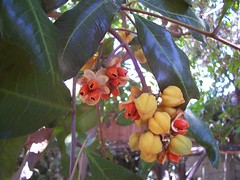Carrotwood Fruit and the Mockingbird
Since we returned from Hawaii, I have noticed a mockingbird frequenting the garden more than ever before. I thought, perhaps, that it had a nest in the garden, since it wasn't making the usually plaintive call of the male seeking a mate, but only a loud chirp every so often as it flitted about the garden.
While there might be a nest, it seems more likely that the mockingbirds are here to enjoy these carrotwood (Cupaniopsis anacardioides) fruits that have started to appear on most of my trees. In fact, this picture from a fellow Flickr user shows a mockingbird investigating the fruit of a carrotwood.
A little Google searching turned up a host of information the carrotwood, including the fact that the USDA in Florida considers it a noxious weed. This is a surprise to me as, here in California, they are widely used in new sub-divisions to create quick, evergreen growth. I haven't noticed them being very invasive in our wetlands area, unlike the killer bamboo and pampas grass you often see. I also haven't noticed any volunteers from the carrotwoods over the years. The native fan palms and the elm trees are much more troublesome in that regard. It only goes to show that you should do your research before planing in your garden, just to make sure it won't become a problem later.
I had several more of these trees in the garden, but I think I am now down to 3 or 4 from an original 8 or 9. The previous owners had overplanted dramatically, so we have spent the last 10 years editing and refining the garden down to more manageable roots.
It is good to see that the carrotwood fruits aren't going to waste. They are another great way to attract different varieties of birds to my garden.
While there might be a nest, it seems more likely that the mockingbirds are here to enjoy these carrotwood (Cupaniopsis anacardioides) fruits that have started to appear on most of my trees. In fact, this picture from a fellow Flickr user shows a mockingbird investigating the fruit of a carrotwood.
A little Google searching turned up a host of information the carrotwood, including the fact that the USDA in Florida considers it a noxious weed. This is a surprise to me as, here in California, they are widely used in new sub-divisions to create quick, evergreen growth. I haven't noticed them being very invasive in our wetlands area, unlike the killer bamboo and pampas grass you often see. I also haven't noticed any volunteers from the carrotwoods over the years. The native fan palms and the elm trees are much more troublesome in that regard. It only goes to show that you should do your research before planing in your garden, just to make sure it won't become a problem later.
I had several more of these trees in the garden, but I think I am now down to 3 or 4 from an original 8 or 9. The previous owners had overplanted dramatically, so we have spent the last 10 years editing and refining the garden down to more manageable roots.
It is good to see that the carrotwood fruits aren't going to waste. They are another great way to attract different varieties of birds to my garden.





0 Comments:
Post a Comment
<< Home